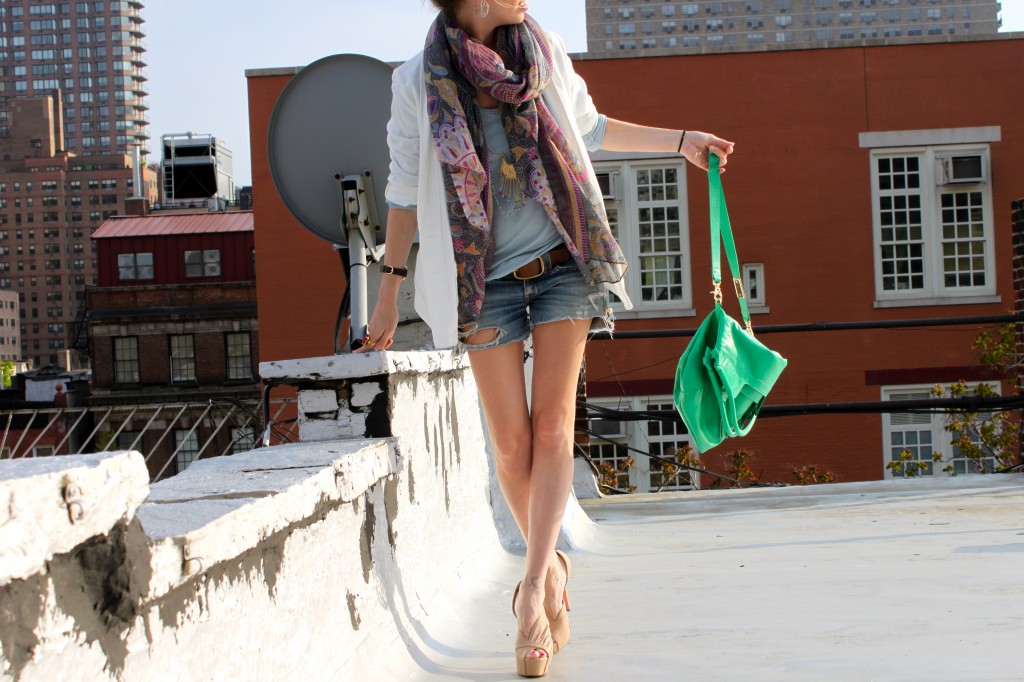
I am so fascinated by the responses – on both sides – to the Bralets At A Wedding? post that I put up yesterday. Because like I said in that post, it is not about a bralet. It’s about how fashion can in a very real way serve as a lightning rod when individuals from different geographical/social/political/religious backgrounds are brought together in an anonymous space (the Internet), and can highlight extremely deep-seated ideas about sexuality, propriety, and morality.
It’s interesting stuff.
(The below is partially poached from my response to “Eeeeeee” – the reader who sent in the original question; I’m reprinting it here because not everyone clicks through to the comments, and I think it’s worth discussing):
First of all, thank you (THANK YOU) for being so open and honest about some important things that I know aren’t easy to talk about with total strangers (body image, questions of self-worth, insecurity, etc) – I know this discussion is “just” about fashion, but you certainly don’t need to justify your decisions to anyone. Even if you want to wander the city streets in minidresses made of tissues and silly string, that’s your prerogative, and hardly something that you should be thrown onto a burning stake for.
But I’ve observed this before on sites that cover fashion, including my own: when fashion is approached through a lens of sexuality and propriety (and bralets by nature, being underwear-as-outerwear, bring both issues to the forefront), a witch-hunt atmosphere can sometimes get stirred up. It can go in the opposite direction, too, with sites that celebrate daring fashion choices decrying their more conservative counterparts’ fashion choices as out-of-touch, stodgy, or boring.
(Important sidenote: To those who have offered contradictory commentary on this topic, I’m not saying that you’re creating a witch-hunt or even that you’re wrong; I think for the most part it’s all quite civil and simply constitutes a difference of opinion. I am, however, very protective of readers who send me questions, and strongly encourage sensitivity even when disagreeing with a choice. The “witch-hunt” attitude that I’m referring to can be seen in a more extreme form in this post, in which I respond to a reader who “forcefully” questioned my decision to wear short shorts while pregnant, as pictured above.)
The thing is, the Internet creates a bizarre space where social, religious, and political groups come together (anonymously, at that) in ways that they rarely would in the “real” world. And what often happens is that even something as small as an offbeat fashion choice has the potential to highlight very deeply rooted differences in opinion (morality, even) that people hold very close to their hearts.
As a real-world example: I like wearing heels a lot. We know this. And I also like wearing things like faux fur coats, and too much jewelry, and shorts with tights, and other things that may raise questions of propriety in certain geographical areas or cultures, but that to my mind look pretty acceptable on the streets of New York City.
And then every few months we go visit my family in a small town in Canada, or Kendrick’s family in a small town in Ohio, and I dress…more or less the same way I always do. I tone it down a little, I guess, not really because I feel like I “should”, but mostly because we usually end up doing a lot of cozy, at-home stuff that makes me want to wear sweatpants and flannels.
Still: when we go to restaurants in these towns, I dress like me, whatever that means.
I remember Kendrick once telling me that when he was a teenager in Ohio he had observed a prevalent sense of…not anger or disgust – nothing that negative – but more of an “Oh, she must really feel like she needs some attention” attitude towards people who dressed “up” when doing so wasn’t “necessary.” And has his observation made me dress differently when we go to his hometown? Maybe a little. In any case, it’s definitely something that pops into my mind from time to time, and will occasionally affect, say, my choice of footwear, or my decision to bring along a more weather-appropriate jacket than the one I really want to wear.
Kendrick’s observation could be right, it be generalizing, or it could be wrong, but for the sake of argument let’s say that the general attitude in Town X towards visitors who, say, wear shorts and heels to the local watering hole is “That is inappropriate.”
So imagine: I go to a bar in Town X dressed normally for me, and I’m spotted by a couple of local girls. And to them, how I’m dressed makes it appear that I’m “trying too hard,” “trying to show off,” whatever. It’s not about whether or not their observations are accurate; it’s about how my choices are viewed through a different cultural lens. But then imagine their conversation in the bathroom, and how quickly it could go from “Oh my god did you see what she was wearing?!” to “What a slut.”
And that would hurt. But I wouldn’t hear that conversation, because it wouldn’t be taking place on the Internet.
Now, does the fact that this conversation might take place mean that I shouldn’t be wearing those things? Only if I want to avoid having people say such things about me at all costs. If that matters to me a great deal, then so be it: I should try to conform to the standards set by the situation in which I find myself, whatever they are. What it comes down to is priorities.
Tl;dr? What I’m saying is that there’s more at play here than questions of a single article of clothing and what kinds of situations it’s appropriate for; there is no “right” or “wrong” answer for that. What flies in one social group simply doesn’t fly in another, but that doesn’t make the first group’s choices “wrong”; it makes them different.
Being respectful, being thoughtful, being mindful both of others and of yourself…all of those things are important.
But so is being brave.
Being different.


